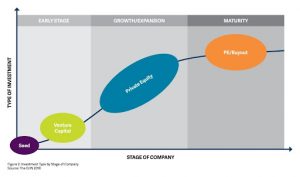This article is written by Tanya Gupta, pursuing Diploma in M&A, Institutional Finance and Investment Laws (PE and VC transactions) from Lawsikho.
Table of Contents
Introduction
In various equity and debt instruments, the collective investment scheme is used for making investments which are called private equity funds. The tenure of the investment horizon ranges between 5 to 10 years with an option of annual extension. One significant feature of a private equity fund is that money that is invested for investment fund is not traded in the stock market and is not available for every individual for subscription due to which capital is usually raised from institutional investors (HNI & Investment Banks) who afford to raise large sum of money for longer period of time. A team of professionals investment from a particular private equity firm deals to raise capital which they further utilize for raising new capital, investing in other private equity firms, funding new startups or technology, future acquisition. It provides an excellent opportunity for a higher rate of return. Companies Act, 2013, Prospectus and allotment of Securities Rules, 2014 and Shares Capital and Debentures, 2014 is the regulatory legal frameworks that governs private equity funds
Shareholders loans and preferred shares, CCPO shares and ordinary shares are the four components of equity.
Types of private equity funds
Venture Capital funds
Small young companies and early-stage startups have limited or no financial source from outside so the funds which are invested in these companies are called Venture Capital Funds. These early-stage startups are generally in their initial stage of formation but eventually have a high chance of growth potential in the future. The new emerging companies with ambitious values and goals have venture capital funds as an excellent source of funding. Venture capital can generate extraordinary returns if it is invested in a bright young startup. In an early-stage startup or small companies venture capital plays the most important role in funding the capital. Limited, trust, corporation or another entity that accepts assets from investors and invests according to investment strategy for the benefit of its stakeholders can also be founded as venture capital funds.
For example: Small companies have the potential to grow and need a certain amount of money so wealthy investors like to invest their money in such small startups with a long term scenario. This capital is known as Venture Capital.
Buyout or leverage buyout (LBO)
Leverage buyout differs in nature from Venture Capital. They generally invest capital in a larger business as compared to venture capital funds along with additional leverage to have favourable returns when invested in an organization. The capital invested is also larger as compared to venture capital. When a company borrows a large amount of money in the form of loans and bonds then leverage buyout takes place to facilitate its acquisition of another company. In order to have a favourable return, an individual should have a major stakeholding in a company for a longer period of time to manage the funds within a company.
The purpose of investment in leverage buyout is to have favourable returns on the acquisition of another company which will outweigh the interest paid on the debt. Leverage buyout is a good option when a firm performs LBO to have favourable returns while investing a small amount of capital. Private equity firms generally opt for a leveraged buyout as it enhances a large return on equity and internal rate of return (IRR) if it all goes well according to the plan by putting a small amount of money at risk. There is only one demerit is that as it increases equity returns simultaneously risk also increases.
For example: An investment firm is owned by David. He wants to buy Store Co, a retail chain. He wants to convert the company into a more cost-effective operation and then sell it. They agreed to purchase the company at $100 million. Now to carry a leveraged buyout. Firstly David promises to pay $10 million and then extend the time period for the rest of the money that is $ 90 million. He acquires Store Co and the Store Co is now liable for payment and if it is not able to pay then the bank will seize its land and other assets.
Real estate
Firms that raise capital to develop, acquire, operate, sell buildings to generate returns to their investors are called private equity real estate firms. Like general private equity firms, real estate private equity firms raise money from Limited Partners who are pension funds, university endowments and insurance companies. Real estate funds invest money in ownership of real estate properties. Such funds have strategies which are as follows:
- Core: Predictable cash flowers with an investment made in low risk/ low return strategies.
- Core Plus: Investment made in modern risk/ modern return strategies in core properties.
- Value Added: Value-added strategies are applicable to properties that have some physical issues and require improvement. Investments are made in medium to high risk/ medium to high return strategy in which property is purchased to improve and sell it again.
- Opportunistic: Investment is made in a high risk/ high return strategy in properties where it requires a massive amount of enhancements.
Growth capital
In mature companies which have generally successful business models, then growth capital private equity funds invest in order to expand, enter new markets, restructure their operations or finance a major acquisition. Growth Capital is generally a small investment as the company in which it invests is basically a large profit-generating enterprise. Such companies are not in the position to use their existing assets for financing the requirement of growth so they take the advantage of growth capital to fund to enter a new market, acquiring a company or other investments. Investors who fund the capital benefit from the high growth potential and moderates the risk of investment. Growth Capital investors generally opt for companies that have low leverage or no debt at all. These types of deals are basically executed by the minority investment and generally preferred shares are the mode of conduct for the investment.
For example: Investment made by Softbank in uber rival grab in 2016 of $ 75 mn was a growth capital investment. Softbank along with other investors led a Series F round of Investment. Now to compete in an efficient way with uber the capital was required. Now they plan to refine its strategy so as to build mapping data and technology, and also work on demand prediction and user targeting.
Fund of funds
It is an investment strategy in which funds are invested in other funds. It is invested in any other type of funds instead of directly investing in stocks, bonds or securities. It has benefits for the investors as it diversifies the risk through investing in multiple funds strategies which are all wrapped in one portfolio. There are different types of funds that accordingly work on different investment schemes. Mutual fund, Private Equity, Investment trust, hedge fund in which the fund of funds can be incorporated. The fund of funds can be fettered or unfettered. Fettered means it can invest in a portfolio which is controlled by only one Investment Company and on the other hand unfettered means it can invest in external funds managed by other managers from other companies. Fund of funds attracts small investors with less risk as compared to directly investing in bonds or locks to get better exposure. Fund of funds provides the investors professional wealth management services and expertise.
For example: Fund manager instead of directly investing in securities holds a portfolio of other mutual funds.
Advantages of investing in private equity funds
- A large amount of funding: An early-stage startup or emerging business can have a large amount of capital through a private equity fund. A private equity fund is the best source of funding as it has no debts.
- Untapped Potential: Though private equity has great potential mostly it is an untapped market as there are many options available in the market from unicorn startups to unlisted private companies and many more.
- Active Involvement: As a shareholder to protect your shareholding interest they can hold the professional management private equity team
- Incentive and returns: Private equity funds are managed by private equity firms which are very highly selective and spend a large number of resources to assess potential companies in which they could invest.
Exit route
Generally, private equity looks towards an exit in an average of 5 to 6 years. It is very important for an investor to plan the exit strategy before investing in any organisation. Unless it is a buyout the private equity investor never plans for long term or long term relationship with a company. So when investors plan for investing in any company it also makes a plan for an exit strategy that how they have to exit from a company because when the exit would be better the investment returns would also be better on investors. The sale of stocks at IPO, selling his stakeholding in the company to the third party, giving the first chance to the promoters to buy back the shares at the prevailing market price all comes under the exit plan. The investor executes their exit plan mainly at the two events when the investment is becoming non-performing and the company is not bringing the profit up to the level due to which there are very limited returns to the investors.
Second when the objective profit threshold has not been met by business venture for the investors. The exit would be profitable when the value for private equity investors lies in. This value is generally earned when the debt is paid back at which is used in funding the company, revenue is grown during the holding period, the company is sold at a higher price as compared to the price at which it was acquired.
For example: Some of the most common strategies for an investor to carry out their exit strategies
- Increase your personal salary and pay bonuses to yourself in the years before exiting your company.
- If you want to retire from the company you can easily sell all your shares to your existing partner and will be able to leave the company easily.
- Liquidate all the assets at the market value.
- Go through an initial public offering.
Conclusion
The companies which are in their initial growth of development private equity are a blessing for them to raise the capital as they lack capital for further expansion. Not only the small companies or early-stage startups but the mature companies also depend on private equity for their expansion and other business deals. Generally, private equity firms invest for 5 to 6 years. Their main objective is to exit from the company with favourable investment returns. When the investor exercises their exit right they adopt a wait and watch approach because they evaluate the market recovery before exercising their exit right. As it has been seen, business activity is improving progressively with investment as the economy adapts it to the normal.
References
- https://corporatefinanceinstitute.com/resources/knowledge/trading-investing/private-equity-funds/
- https://www.interviewprivateequity.com/types-of-private-equity-funds/
- https://www.investopedia.com/articles/financial-careers/09/private-equity.asp
- https://www.coverfox.com/personal-finance/mutual-funds/private-equity-fund/
- https://www.cfsg.com.au/types-private-equity-funds/
- https://www.uschamber.com/co/run/business-financing/private-equity-fund-guide
Students of Lawsikho courses regularly produce writing assignments and work on practical exercises as a part of their coursework and develop themselves in real-life practical skills.
LawSikho has created a telegram group for exchanging legal knowledge, referrals, and various opportunities. You can click on this link and join:
 Serato DJ Crack 2025Serato DJ PRO Crack
Serato DJ Crack 2025Serato DJ PRO Crack












 Allow notifications
Allow notifications


